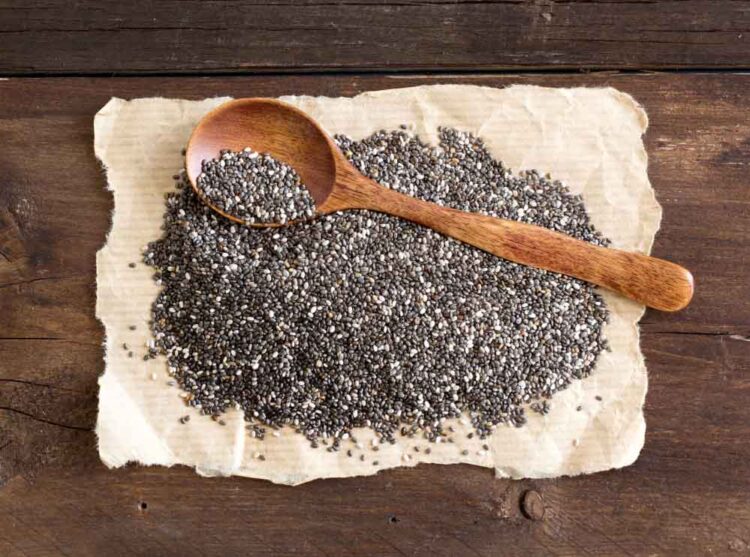Did you know that a fish-free diet can still meet your omega-3 needs? Contrary to popular belief, omega-3 fatty acids can be obtained from plant-based sources, making it possible for vegans, vegetarians, and those who dislike fish to benefit from these essential nutrients. Whether you’re looking to reduce inflammation, improve heart health, or support brain function, incorporating plant-based omega-3 sources into your diet is a smart move.
Key Takeaways:
- Plant-based omega-3 sources are essential for those following a fish-free diet.
- Omega-3 fatty acids offer a range of health benefits, including reduced inflammation and improved heart health.
- Chia seeds and Brussels sprouts are excellent plant-based sources of omega-3 fatty acids.
- Balancing your omega-6 to omega-3 ratio is crucial for optimal health.
- By incorporating plant-based alternatives, you can meet your omega-3 needs and enjoy the benefits of a fish-free diet.
Chia Seeds: A Nutrient-Dense Superfood
Chia seeds are no ordinary seeds. These tiny powerhouses are packed with essential nutrients and are a fantastic plant-based source of ALA omega-3 fatty acids, making them an excellent addition to any diet.
Known for their health benefits, chia seeds have been shown to decrease the risk of chronic diseases when included as part of a balanced diet. Just one ounce of chia seeds provides a significant amount of ALA, surpassing the daily recommended intake for omega-3 fatty acids.
What makes chia seeds truly remarkable is their versatility. They can be easily incorporated into various dishes, allowing you to enjoy their health benefits in a variety of ways. Add them to chia puddings, salads, yogurts, and smoothies for a nutritious and satisfying boost.
“Chia seeds are a treasure trove of essential nutrients, including protein, fiber, and healthy fats. Their omega-3 content adds an extra layer of health benefits, making them a must-have in any diet.”
Not only are chia seeds rich in ALA omega-3 fatty acids, but they also offer other impressive health benefits. They are a great source of fiber, promoting healthy digestion and aiding in weight management. Additionally, chia seeds are packed with antioxidants, which help protect the body against harmful free radicals.
The Benefits of Chia Seeds:
- Rich source of ALA omega-3 fatty acids
- High in fiber for improved digestion
- Packed with antioxidants to support overall health
- Provides essential nutrients, including protein and minerals
Whether you’re following a vegan lifestyle, looking for nutrient-dense foods, or seeking alternatives to fish-based omega-3 sources, chia seeds are an excellent choice. Their omega-3 content, along with their many other health benefits, make them a true superfood.
Next up, we’ll explore another incredible plant-based source of omega-3 fatty acids: Brussels sprouts!
Brussels Sprouts: More Than Just a Side Dish
In addition to being a rich source of vitamin K, vitamin C, and fiber, Brussels sprouts are an excellent plant-based source of omega-3 fatty acids. These cruciferous vegetables offer numerous health benefits, particularly for heart health.
Consuming Brussels sprouts has been associated with a lower risk of heart disease, thanks to their omega-3 content. Omega-3 fatty acids are essential nutrients that support cardiovascular health by reducing inflammation and promoting proper functioning of the heart.
Both raw and cooked Brussels sprouts provide a considerable amount of alpha-linolenic acid (ALA), the type of omega-3 fatty acid found in plant sources. Cooked Brussels sprouts, in particular, have slightly higher ALA content compared to their raw counterparts.
There are several delicious ways to incorporate Brussels sprouts into your meals. Roasting them in the oven brings out their natural sweetness and adds a delightful caramelized flavor. Steaming Brussels sprouts helps retain their vibrant green color and crisp texture. Blanched Brussels sprouts are tender and versatile, perfect for adding to salads or stir-frying. No matter how you choose to prepare them, Brussels sprouts can be a tasty and nutritious addition to your diet, providing you with omega-3 fatty acids and other essential nutrients.
The Benefits of Brussels Sprouts
Brussels sprouts offer a range of health benefits, including:
- Promoting heart health: The omega-3 fatty acids found in Brussels sprouts help reduce the risk of heart disease by improving cholesterol levels and reducing inflammation.
- Boosting immune function: Brussels sprouts are loaded with vitamin C, which supports immune system function and helps protect against illnesses and infections.
- Aiding digestion: With their high fiber content, Brussels sprouts contribute to healthy digestion and can help prevent constipation.
- Supporting bone health: Vitamin K, abundantly found in Brussels sprouts, plays a crucial role in bone health and helps maintain bone density and strength.
- Providing antioxidants: Brussels sprouts are rich in antioxidants, which help protect cells from damage caused by harmful free radicals.
So, don’t just think of Brussels sprouts as a side dish. Incorporate them into your meals and enjoy the benefits they provide, including omega-3 fatty acids for heart health, among other vital nutrients.
Conclusion
Meeting omega-3 needs without consuming fish is possible through a plant-based diet. While fish oil and fatty fish are well-known sources of omega-3 fatty acids, there are several alternatives for vegans, vegetarians, and those who dislike fish. Chia seeds, Brussels sprouts, algal oil, hemp seeds, walnuts, flaxseed, and perilla oil are all excellent sources of plant-based omega-3s. By incorporating these foods into a balanced diet, individuals can meet their omega-3 needs and support overall health.
It’s important to note that while plant-based sources primarily contain alpha-linolenic acid (ALA), which the body can convert into eicosapentaenoic acid (EPA) and docosahexaenoic acid (DHA), conversion rates may be limited. Therefore, it may be beneficial to consider supplementing with algal oil, which provides preformed EPA and DHA for those on a fish-free diet.
In addition to incorporating plant-based omega-3 sources, maintaining a balanced omega-6 to omega-3 ratio is crucial for optimal health. Consuming too many omega-6 fats relative to omega-3s can promote inflammation and increase the risk of chronic diseases. By choosing plant-based omega-3 sources and ensuring a balanced intake, individuals can support a fish-free diet while promoting overall wellness and reducing the risk of inflammation-related illnesses.











